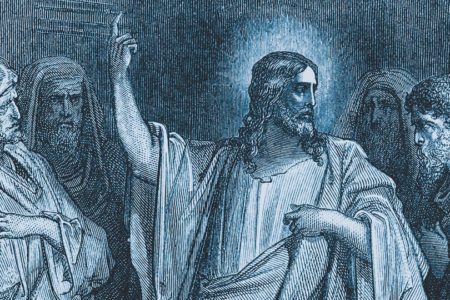Recycling History
A look at today’s religiously unaffiliated and their not-so-new view of the world
Israel’s wise King Solomon, with years of world-watching behind him, concluded, “That which has been is what will be, that which is done is what will be done, and there is nothing new under the sun” (Eccl. 1:9). History is a process of recycling, yet people never seem to learn much from the past; and trashing the “old” ways in a quest to be different doesn’t often deliver what is promised.
Root and Branch
At the root of the most catastrophic failures in the recycling process is the rejection of God and rebellion against His divine standards of faith and practice. Scripture warns and history confirms the dire consequences. Today, signs that we are moving in that same fatal direction are too numerous to ignore.
Greg Smith, with the Pew Research Center, told The Washington Post, “What we’re seeing now is that the share of people who say religion is important to them is declining.” Furthermore, “The religiously unaffiliated are not just growing, but as they grow, they are becoming more secular.”1
Smith’s observation is certified by the shrinking number of regular attenders in mainline Protestant and Catholic churches and the dropout rate in some churches loosely identified as evangelical. The religiously unaffiliated are often referred to as “nones” because they follow none of the traditional religions, believe nothing in particular, or have chosen atheism or agnosticism as a lifestyle.
A curious sidebar is that they repudiate traditional religion but not spirituality, which means a neo-pagan center of gravity has taken hold.
Religion has become a distasteful word, and people are jettisoning God and the Bible for whatever suits them personally. In his book Spiritual, but Not Religious, religious-studies professor Robert Fuller pointed out that in the 20th century, “The word spiritual gradually came to be associated with the private realm of thought and experience while the word religious came to be connected with the public realm of membership in religious institutions, participation in formal rituals, and adherence to official denominational doctrines.”2
He said a group of social scientists studied 346 people from varying backgrounds and found the following: “Religiousness . . . was associated with higher levels of church attendance and commitment to orthodox beliefs. Spirituality, in contrast, was associated with higher levels of interest in mysticism, experimentation with unorthodox beliefs and practices, and negative feelings toward both clergy and churches.”3
Do-It-Yourself Faith
This trend marks a return to the old ways of demoting the true God, discarding divine authority, and defining faith as personal belief based on individual whim—all of which fall into Solomon’s bin marked “nothing new under the sun.” That age-old category has left deep and ugly tracks on the historical record.
The first Adam, along with his wife, Eve, set the standard for buying into Satan’s seducing lie of liberation from the Almighty. When Satan confronted them concerning their Creator’s specific instructions of do’s and don’ts, they chose to see things Satan’s way. The prince of seduction asked, “Has God indeed said, ‘You shall not eat of every tree of the garden’?” (Gen. 3:1).
In essence, Eve replied, “Yes, except one. If we do, we shall die.”
To which the Devil answered, “You will not surely die. For God knows that in the day you eat of it your eyes will be opened, and you will be like God, knowing good and evil” (vv. 4–5).
Man and wife fell for the ploy, partook of the forbidden fruit, and died. Though they continued to live physically, spiritually they became dead; and the effects were immediate. Instead of being elevated to a godlike state, they were dragged down to fallen-creature status. Worse, Adam dragged the entire future human race down with him: “By man came death,…as in Adam all die” (1 Cor. 15:21–22). That dire consequence made all human beings hereditary sinners by nature.
There are those, of course, who mock the biblically recorded episode in the Garden of Eden. They call it myth, legend, and nonsense. However, no argument can refute the grim evidence of sin resident in Adam’s posterity.
Contemporary Recycling
Israel’s history reveals the folly of turning away from God. The book of Judges shows what happens when people embrace the principles of the “none” faction now growing among us.
NOT TO THE STRONG
Read about the heroes of Judges, a dark period of Israel’s history, in Not to the Strong by Elwood McQuaid.
Rather than standing as a nation united, Israel became a fragmented, leaderless, divided tribal conglomeration. Elements most descriptive of the Israelites’ situation included forsaking the God of their fathers; worshiping the man-made gods of their pagan neighbors; viewing their enemies’ ways as superior to their God-given ones; and adopting the corrupt, vulgar, and degrading morals of the godless heathen among them.
In short, His Chosen People became deluded, divided, and demoralized— victims of their own folly. A depressing futility imbues the final verse of Judges: “In those days there was no king in Israel; everyone did what was right in his own eyes” (21:25). The conclusion is obvious. Self-centeredness is never a pattern for success or unified, national stability. Israel’s hapless history in Judges is a clear picture of the fate of a country that does not turn back to the Lord.
Fortunately, the ancient Israelites periodically cried out for reconciliation with the Lord they had so deeply offended. And graciously, He the eventual coming of King David. But Israel is God’s covenant nation. Throughout Scripture, He promises to restore it for His name’s sake. Nowhere does He promise to restore America, for example, which is all the more reason this country needs to get right with God before it is too late.
If I Perish, What Then?
What happens to the “nones” when they die? There is no shred of true hope in the future of God-free mortals. Thomas Jefferson, author of the Declaration of Independence and third president of the United States, was a man of unequalled intellect in his contribution to the founding of the American democracy.
Though he admired the moral aspects of the New Testament, he rejected Jesus’ miracles and was particularly put off by the resurrection. In fact, he created his own version of the Gospels by literally cutting out portions and pasting together an 82-page document, preserved as The Jefferson Bible. The closing entry reads, “There laid they Jesus: and rolled a great stone to the door of the sepulchre, and departed.”4 What a sad, erroneous conclusion. All of his intellectual abilities could take him no further than to a sealed sepulcher, closed to anything beyond, which illustrates the ageless spirit of absolute or partial denial.
The King is Coming
History inevitably circles back to the same patterns of former generations. The current dream to colonize Mars, erect tent cities on the moon, or find another celestial world to inhabit is evidence of a futile quest—a leap in the dark to find a future beyond planet Earth. It won’t happen.
The good news is that a new heaven and new Earth have been ordered by the Master Creator who declares, “Behold, I make all things new” (Rev. 21:5).
The King of kings is coming. Folded into the plan for believers is the Rapture of the church; the resurrection of the saints; rewards; and a Kingdom where peace, justice, and truth reign for a thousand years in preparation for the new heaven and Earth. Such is the enduring
“blessed hope” of authentic, biblical spirituality. And it is available to all who place their faith in Jesus Christ.
ENDNOTES
- Melanie Batley, “Christianity Declines Sharply in US, Agnostics Growing: Pew,” Newsmax, May 12, 2015 <tinyurl.com/ov45ovn>.
- Robert C. Fuller, Spiritual, but Not Religious (Oxford University Press, Oxford: 2001), 5.
- Ibid., 6.
- Thomas Jefferson, The Life and Morals of Jesus of Nazareth (The Jefferson Bible), LXIX “His Burial” <sacred-texts.com>.








